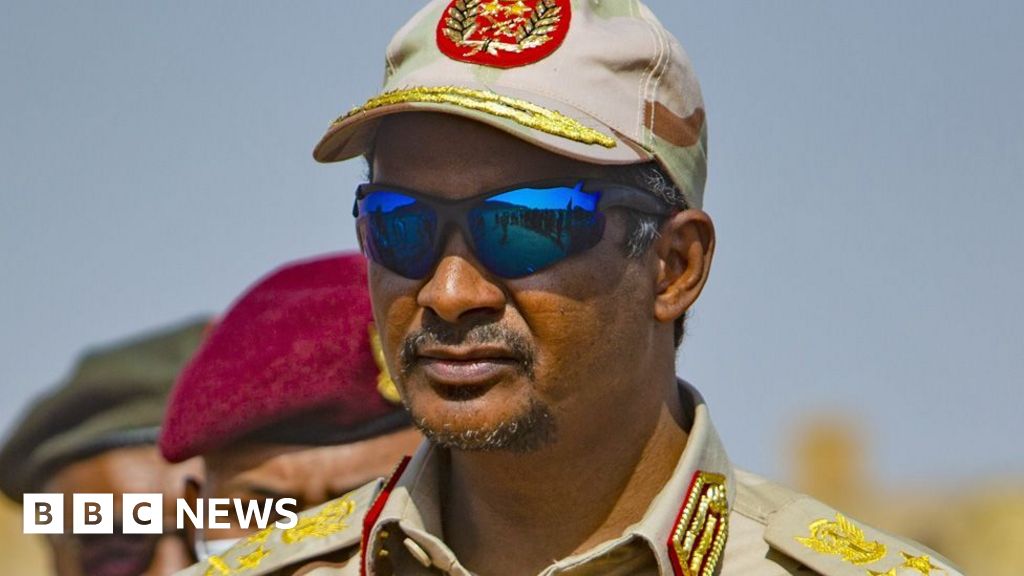He made his money selling camels and gold. Now this warlord controls="controls" half of Sudan

Sudan's Warlord: How 'Hemedti' Rose to Control Half the Country Amidst Famine and Atrocities
Mohamed Hamdan Dagolo, known as "Hemedti," has become a dominant figure in Sudan's ongoing conflict, with his paramilitary Rapid Support Forces (RSF) controlling approximately half of the country. This expansion follows a recent significant victory: the RSF's capture of el-Fasher, the last garrison held by the Sudanese army and allied local forces in the Darfur region. The city's residents are now facing severe famine conditions after an 18-month siege, according to a UN-accredited food security assessment.
Hemedti's rise from humble beginnings as a camel trader to a powerful warlord underscores the complex and volatile dynamics of Sudanese politics and the legacy of the Darfur conflict. His forces have been accused of widespread atrocities, raising serious concerns about human rights and accountability. While feared by his adversaries, Hemedti maintains a following based on his perceived tenacity, ruthlessness, and promises to dismantle a corrupt state.
From Camel Trader to Paramilitary Leader
Born in the mid-1970s into the Rizeigat community, a camel-herding group spanning Chad and Darfur, Hemedti's early life was marked by hardship. He dropped out of school in his teens and earned a living trading camels across the desert. During this period, Darfur was a lawless region neglected by the government of then-President Omar al-Bashir, a context that fostered the growth of armed groups and ethnic tensions.
The emergence of the Janjaweed militias, including one led by Hemedti's uncle, Juma Dagolo, marked a turning point. These militias, drawn largely from Arab communities, launched attacks on the villages of indigenous Fur ethnic groups, leading to a full-scale rebellion in 2003. Bashir responded by expanding the Janjaweed to combat the rebellion, and Hemedti's unit became part of this force, implicated in widespread atrocities. Reports from African Union peacekeepers detailed incidents such as the attack on Adwa village in 2004, where civilians, including children, were killed.
While the International Criminal Court (ICC) brought charges against several individuals, including Bashir, for war crimes and crimes against humanity in Darfur, Hemedti was not among those initially targeted. He capitalized on the instability and violence, strategically positioning himself to rise through the ranks.
Consolidating Power: Gold, Mercenaries, and Political Maneuvering
In the years following the peak of the Darfur conflict, Hemedti demonstrated a keen ability to exploit opportunities. He briefly mutinied to secure better conditions for his soldiers, then led government forces against other mutinous Janjaweed units, gaining control of the Jebel Amir gold mine. This acquisition fueled the rapid growth of his family company, Al-Gunaid, which became Sudan's largest gold exporter.
In 2013, Hemedti formalized his position by establishing the Rapid Support Forces (RSF), a paramilitary group reporting directly to Bashir. The RSF integrated elements of the Janjaweed, providing them with new resources and training. The force's involvement in suppressing rebellions and policing borders, along with accusations of extortion and human trafficking, further solidified Hemedti's influence.
A pivotal moment came in 2015 when Saudi Arabia and the United Arab Emirates (UAE) sought Sudanese troops to fight in Yemen. Hemedti negotiated a separate deal to provide RSF mercenaries, establishing a close relationship with the Emirati president, Mohamed bin Zayed. This alliance provided crucial financial and political support, enabling the RSF to expand its recruitment and acquire advanced weaponry. Allegations have surfaced regarding the UAE's continued support of the RSF through supply lines via Chad, which the UAE denies.
"Hemedti's ability to cultivate relationships with external actors, particularly in the Gulf, has been instrumental in his rise," explains Dr. Fatima Hassan, a Sudanese political analyst at the University of Khartoum. "These alliances provide him with resources and legitimacy that he wouldn't otherwise have."
From Ally to Adversary: The Current Conflict
As popular protests mounted against Bashir's regime, Hemedti's RSF was deployed to Khartoum. However, in a surprising turn, Hemedti joined forces with other generals to depose Bashir in April 2019. He initially presented himself as a reformer, but this image quickly faded as he and General Abdel Fattah al-Burhan, head of the army, resisted transferring power to civilians. The RSF was implicated in the violent suppression of pro-democracy protests, including the killing of hundreds of people.
The uneasy alliance between Burhan and Hemedti ultimately collapsed. Disagreements over the integration of the RSF into the army led to open conflict in April 2023. Khartoum became a battleground, and violence spread to Darfur, where the RSF has been accused of atrocities against the Masalit people. The conflict has resulted in a dire humanitarian crisis, with millions displaced and widespread reports of looting and human rights abuses.
The capture of el-Fasher represents a strategic victory for the RSF, giving them control over a large swathe of western Sudan. However, the ongoing conflict has raised serious questions about the future of the country and the potential for a lasting peace. Hemedti's ultimate goals remain unclear, with speculation ranging from the establishment of a breakaway state to a continued power struggle for control of all of Sudan.
"The situation in Sudan is incredibly complex," says Alex de Waal, executive director of the World Peace Foundation. "Hemedti's actions are driven by a combination of ambition, opportunism, and a belief in his own impunity. The international community needs to take a much stronger stance to hold him and other actors accountable for their actions."
As the conflict continues, the humanitarian crisis deepens, and the prospects for a peaceful resolution remain uncertain. The legacy of Hemedti's rise to power, marked by violence, opportunism, and external support, will continue to shape the future of Sudan for years to come.
Originally sourced from: BBC News Africa
